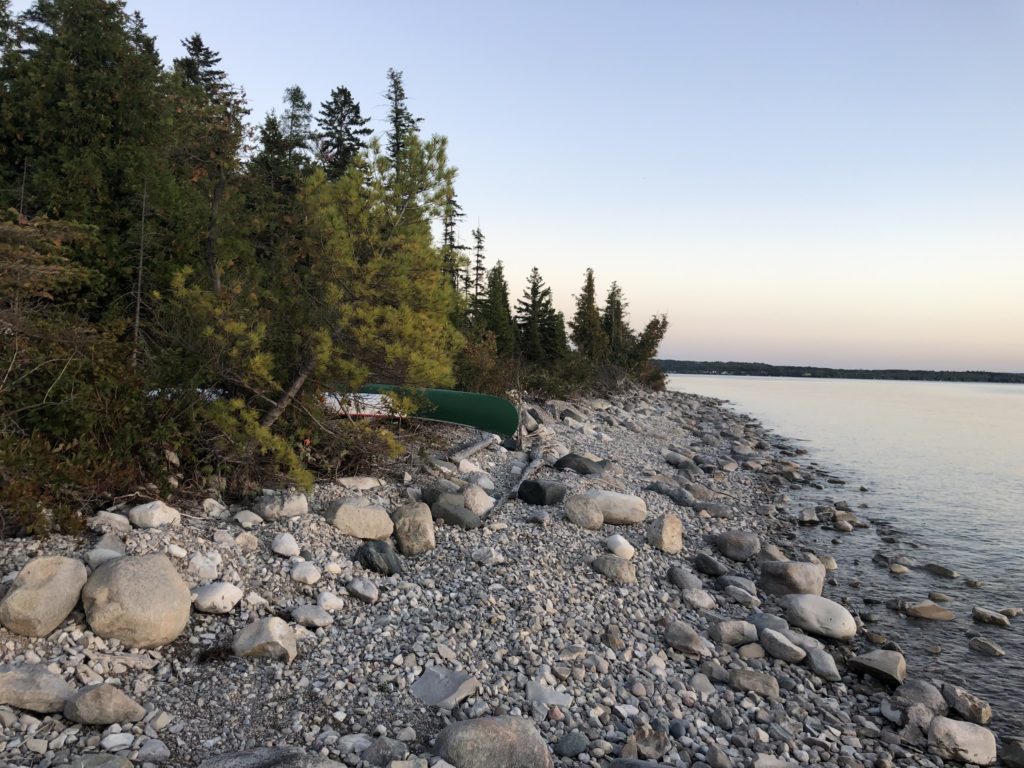The drastic changes include:
Removes the word “natural” from the intent section, that the shoreland “must be preserved in a natural fashion.” Removed also is “and community scenic and recreational values.”
Reduces the size of the Shoreland Protection Strip to just 25-25 feet from a strict 50 feet, which has been in place for decades. Tip of the Mitt recommends 50 feet or more. This is a drastic step in the wrong direction.
Eliminates the critical phrase that prohibits excavation, that the Shoreland Protection Strip “shall include all of the land area”within 50 feet from the shore/Ordinary High Water Mark. (November 2021 version). UPDATE: The October 2022 version inserts the phrase back in and then institutes a giant exception “depending on the unique characteristics of the property.”
Further guts protection from excavation by changing the prohibition on removal of tree root systems to “Tree root systems should [rather than SHALL] be left in place for shoreline stabilization” and then adds… “whenever possible.”
Changes the wording “preventing soil erosion” to “inhibiting soil erosion.”
Changes “the strip should not be altered more than 20%” from “shall not be altered more than 20%.” UPDATE: The October 2022 version inserts another giant exception to the concept of “altering” (which currently refers only to 20% vegetation removal): “unless permitted as part of an approved shoreline landscaping plan or a permit from the Army Corps of Engineers and the State Department of Energy, Great Lakes and Environment [sic].” This would allow the Planning Commissioners to grant variances–which is forbidden by state law–and considers “altering” to include altering/removing the uplands, conceding jurisdiction over excavation of the Shoreland Protection Strip to the state and federal agencies–abdicating totally Hayes Township’s authority to protect the shoreland from excavation.
Guts the compliance element of the Waterfront Development Review process outlined in Section 3.14(8) from its current purpose to “ensure the compliance” with the rest of the Waterfront Regulations, to “in an attempt to increase compliance…” UPDATE: The October 2022 version adds that the so-called Shoreland Protection subcommittee “is empowered to suggest that compliance with the intent of Article V is met even if it includes modifications of the plantings or dimensional guidelines as presented by the owner or landscaper, when the entirety of the plan and its effect on improving water quality is considered.” Again, the granting of variances that is simply not allowed by law. For example, the zoning ordinance requires replanting only with native species. This clause would allow otherwise, essentially granting a variance from the ordinance.
Removing the required participation of an organization with scientific expertise in lake ecology in the shoreland protection review process, with an option of consulting an expert only “as needed.”
Why is Hayes Township no longer interested in protecting the lake?
The current definition Shoreland Protection Strip is “a strip of land fifty feet in depth landward from the Ordinary High Water Mark, placed as to be parallel to the body of water.”

The new proposed language in the definitions sections is: Shoreland Protection Strip – An area of protective ground cover extending from the OHWM OR PROPERTY LINE inland twenty- five (25) to thirty (30) feet to limit erosion and provide filtration of runoff into the water.

